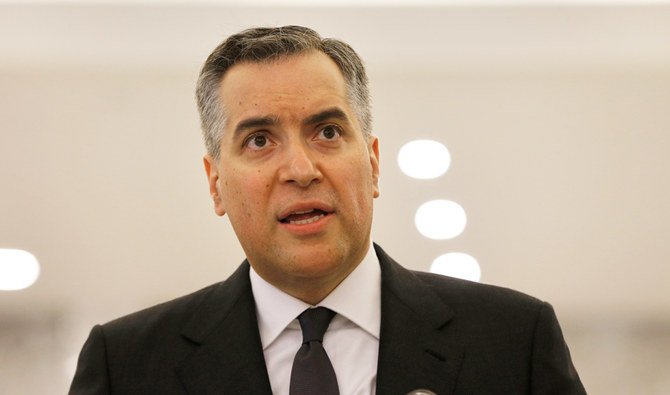
- ARAB NEWS
- 27 Apr 2024

Najia Houssari
Lebanon has experienced almost a year of intense turmoil, which has been exacerbated by the coronavirus pandemic and the devastating Aug. 4 explosion in Beirut. It is in desperate need of a bailout, but the international community will only give this aid when Lebanon delivers the required reforms.
Prime Minister-designate Mustapha Adib was tasked with forming a new government when the previous one resigned after the blast. But Adib, who was nominated to the job on Aug. 31, said he was stepping down.
The EU’s High Representative for Foreign Affairs Josep Borrell on Monday expressed his “disappointment and concern” over Adib’s exit and the circumstances that had led to his decision.
He said: “Lebanese leaders must come together and do everything in their power to form a government quickly. The swift formation of a government would be also crucial to reach an urgently needed agreement with the International Monetary Fund.”
French President Emmanuel Macron expressed his fury with the Lebanese political elite on Sunday, describing the collapse of negotiations as “a betrayal and a failure to respect the commitment they had made in his presence” during his two visits to Beirut after the explosion.
His tough stance sparked protests against Lebanese authorities on Sunday night, with the army deployed the following morning to prevent possible roadblocks. There were calls on social media for people to take to the streets again, but traffic remained normal.
Macron has left the door open and given political leaders an additional six weeks to form a new government whose mission is to implement long-overdue reforms.
But Lebanon’s presidential palace did not release a statement regarding the future steps to be taken to find a solution to the deadlock undermining the government’s formation, and it appears unlikely that a date to hold binding parliamentary consultations to name a new prime minister will be scheduled in the coming days.
Sources at the presidential palace said that Macron’s words were “harsh and we will evaluate it,” while President Michel
Aoun reiterated his commitment to Macron’s initiative and praised the French leader for his interest in the country and its people.
Aoun, according to his office, “regretted Adib’s inability to form a government according to the French president’s initiative, particularly when it comes to the reforms that should be implemented, whether those that require laws to be approved by parliament or those that will be issued by the government after its formation and after gaining the confidence of parliament.”
Hezbollah and the Amal Movement have not commented on Macron’s statement.
But statements in the past 24 hours from those close to Hezbollah regarded his remarks as unfair, and called on people to wait for Tuesday’s speech from Hezbollah’s Secretary-General Hassan Nasrallah.
Ali Hassan Khalil, an Amal Movement-affiliated member of the Development and Liberation Parliamentary Bloc, refused to comment on Macron’s statement, saying “the initiative that was approved was codified and distributed, while its content is well-known.”
Iranian Foreign Ministry spokesman, Saeed Khatibzadeh, said: “The situation in Lebanon is a domestic matter that needs to be solved between the Lebanese themselves. There are talks between Iran and France. However, Iran does not call on any foreign country to intervene in Lebanon.”
Mustafa Allouch, a member of the Future Movement, said that the French president was criticizing everyone so that nobody could accuse him of bias.
“Macron directly criticizing President Michel Aoun, Hezbollah and the Amal Movement, along with the rest of the Lebanese parties including the Future Movement, was aimed at holding everyone responsible so that nobody can consider he is siding with a party against another,” he told Arab News.
The Future Movement was not interested in naming any figure to entrust with the government’s formation before reviewing other options, he said. Saad Hariri, the country’s former prime minister who resigned last year, would not suggest any name and would not be a candidate, Allouch added.
“Aoun expressed his commitment to the French initiative and everyone knows, including Hezbollah, that things are not that simple. The Amal Movement started to feel like it is cornered, but nothing will change as long as Hezbollah does not change its position.”
Allouch believed that overcoming the deadlock required a significant event, such as the US presidential elections, a major security event or new understandings for a new country.
Two anti-Hezbollah bodies, the Lady of the Mountain Congress and the National Initiative Movement, said the lesson the Lebanese had learned from the French initiative and Macron’s words was that going against the constitution, the national reconciliation charter and UN resolutions would not lead to the establishment of a state in Lebanon.
They added that restoring the state in Lebanon was impossible under the influence of Hezbollah’s weapons, just like it was impossible to abide by the constitution by establishing sectarian councils.
They also announced that they were working with other political formations and figures to draft a joint periodic program to “free Lebanon from Iran’s tutelage” and establish a state based on the rule of law, sovereignty and independence.